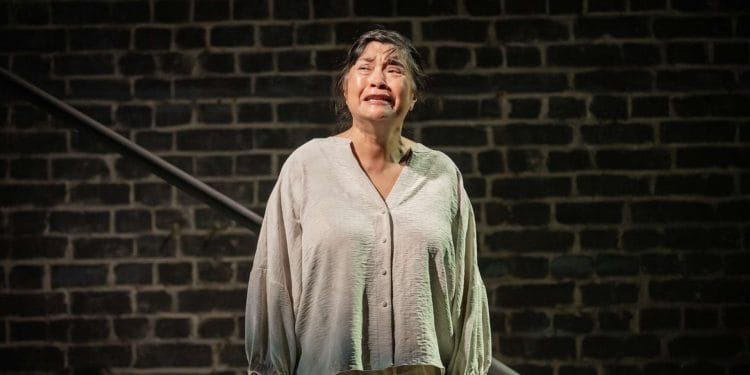 It’s rare for a play to be truly shocking, and even rarer to be able to continue to shock right up until its final scene, but that’s what is achieved by Kyo Choi’s new work The Apology. Produced by New Earth Theatre and The North Wall, and now playing at London’s Arcola Theatre, this world premiere tells a powerful story.
It’s rare for a play to be truly shocking, and even rarer to be able to continue to shock right up until its final scene, but that’s what is achieved by Kyo Choi’s new work The Apology. Produced by New Earth Theatre and The North Wall, and now playing at London’s Arcola Theatre, this world premiere tells a powerful story.
Directed by Ria Parry, Choi’s play is based on the testimony of the World War Two survivors known as the ‘comfort women’. According to these testimonies, thousands of young girls, many from South Korea, were recruited into the Female Voluntary Corps, and were expecting to work in hospitals or factories. Instead, they were forced into becoming sex slaves for the ranks of the Japanese Imperial Army.
The story largely follows the plight of Kim Sun-Hee (Sarah Lam), the first ever woman to publicly talk about what these women went through, at one point telling us of ‘comfort stations’ where for every one hundred soldiers there would be one woman, who would be raped multiple times a day, every day, for years.
More women would follow in Sun-Hee’s footsteps to speak out, but a cover-up would prevent the women, and the wider public, from finding out just how much politicians knew, and ignored, their suffering.
Intertwining with Sun-Hee’s story is that of Han Min (Kwong Loke) and Han Yuna (Minhee Yeo), a father and daughter with a deep family secret, and Priyanka Silva (Sharan Phull) the UN Human Rights Investigator tasked with uncovering what really happened, whilst dealing with Jock Taylor (Ross Armstrong) a racist misogynist from the US Embassy.
Choi’s script unravels along a parallel path to Silva’s investigation, the horrors of what these women went through revealed in surprising fashion. It’s a testament to the writing that the audience were gripped, and often with mouths agape, for much of the performance.
But this isn’t just the story of what these women went through at the time; though the younger version of Sun-Hee, known as Kwon Bok-Hae, played by Jessie Baek does that beautifully, there’s also the aftermath, and how living a life clouded with shame ruined lives for generations to come.
“We need justice or it’s all been for nothing” says Sun-Hee as the scale of the political cover-up becomes apparent, but the apology that was to come from the Japanese many years later doesn’t feel like justice has been served.
Although The Apology loses some of its otherwise strong momentum towards the end of the second act, it remains filled with powerful and emotional performances from an outstanding cast. Jamie Lu’s sound design is emotive and wonderfully punctuates each scene, on TK Hay’s minimal but striking set.
At one point, Kwon Bok-Hae reads a letter to her mother following her release from the comfort station, she is unable to tell the truth about what has happened to her, so the older Sun-Hee translates her true feelings. It’s an incredibly poignant moment and sums up not just the bravery of the women involved, but the bravery of the creative team of The Apology to tell this story unapologetically.


















Comments 3